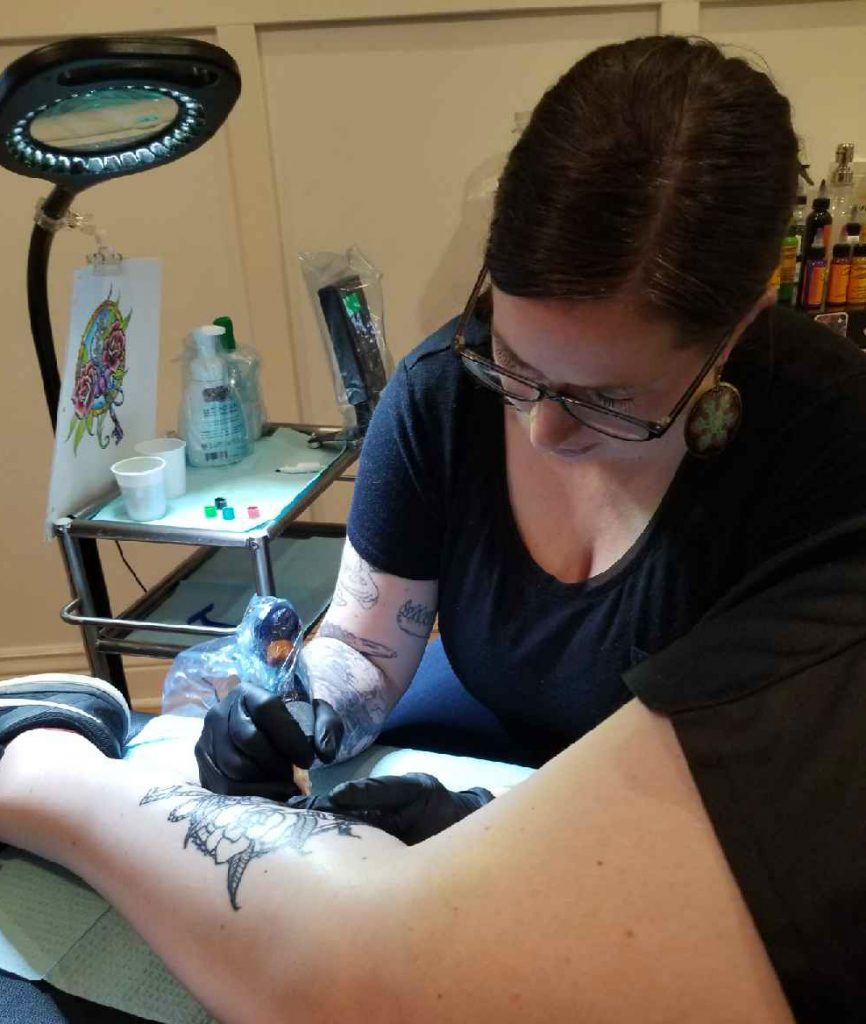Everywhere we look there is plastic and it’s starting to become a big problem. Plastic waste is the environmental crisis of the 21st Century and it threatens to choke our seas and decimate aquatic ecosystems. Writer and tattoo enthusiast Matt Haddon-Reichardt met up with vegan tattooist Ashley Thomas to find out if anything can be done by the tattoo industry to cut the waste…
“I would say that my shop, Echelon Tattoo probably generates 1300 bags of trash every year, and fills six sharps containers. Since we are an all disposable shop, the sharps container contains probably 80-90 percent plastic (cartridges, disposable tubes and needles, razors), and our trash bags are probably about 40 percent (gloves, rinse cups, ink caps, blue medical bib backing, equipment barriers, and the trash bag itself). That’s a lot of plastic but most of the waste I would say is a serious mountain of paper towels and gloves.” Ashley explains as we sip black coffee.
Ashley owns Echelon Tattoo in Midvale, Utah, and is a passionate vegan, environmentalist and artist. She has been tattooing for 13 years and is acutely aware of the plastic waste problem. I ask her how plastic heavy tattooing actually is.
“Ink caps, razors, cartridges, gloves, rinse cups, equipment barriers and medical bibs are all items that either contain or are composed of plastic in varying quantities. The good news is that industry manufacturers are starting to consider this and coming up with new products to address the growing concern over plastic. Black Claw now produces disposable tubes made from cork, and Rose City Supply was offering biodegradable equipment barriers. I think you’re going to see more artists and shops look for these products too as awareness increases. In terms of metal tubes, I think there’s still a fair amount of waste; there’s still the matter of the autoclave bags that need to be used daily, and the water and electricity to run each load in the autoclave and the plastic container for the distilled water used in the autoclave. I think whether or not to use cartridges or plastic tubes vs. metal tubes will always come down to personal preference of the artist.”
We can all make a difference to the plastic problem and Ashley is doing her upmost to eliminate plastic from her tattooing:
“I am always looking for ways to reduce waste and be more environmentally friendly at work, just as I am at home and in all aspects of my life. It can be really tricky in tattooing; so many plastic items keep both us and our clients safe. I don’t know of a current alternative for gloves, but I am looking to try out biodegradable trash bags. I was using the biodegradable equipment barriers from RCS, but I believe they’re discontinued as I haven’t found another supplier that carries them.”
One problem with tattooing is that contaminated waste must be disposed of safely. Ashley appreciates that it’s not just a matter of eliminating plastics but how we process then when they are thrown away. “Waste disposal in general is woefully inadequate when it comes to factoring in environmental impact. I think it would require working with environmental and health officials to come up with the greenest possible solution to this problem. I’m certain that manufacturing and using biodegradable options whenever possible would be helpful.”
Many artists are now going vegan when it comes to tattooing. Ashley feels vegan tattooing is the future when it comes to managing waste products including plastics.
“I believe using a vegan option is generally always a good thing. Animal agriculture, and therefore animal products and by-products, consume larger resources to produce than their plant-based counterparts, so production waste is typically less. In terms of plastic that’s obviously not a win for the environment, that’s why we need more plant-based, biodegradable solutions.”
One big waste product from tattooing is the cling film used to cover fresh tattoos. I ask Ashley if there are any alternatives.
“I believe a barrier is absolutely necessary to keep the customer, the artist, and everyone else in the shop safe from cross-contamination until the customer leaves the premises. I think, again, that we really need to work with the industries that manufacture the products we use to come up with biodegradable alternatives – biodegradable barrier films, tapes, razors, ink caps, etc, would all be a huge win for us and for the environment.”
Words: Mathew Haddon-Reichardt
Image: Ashley Thomas
